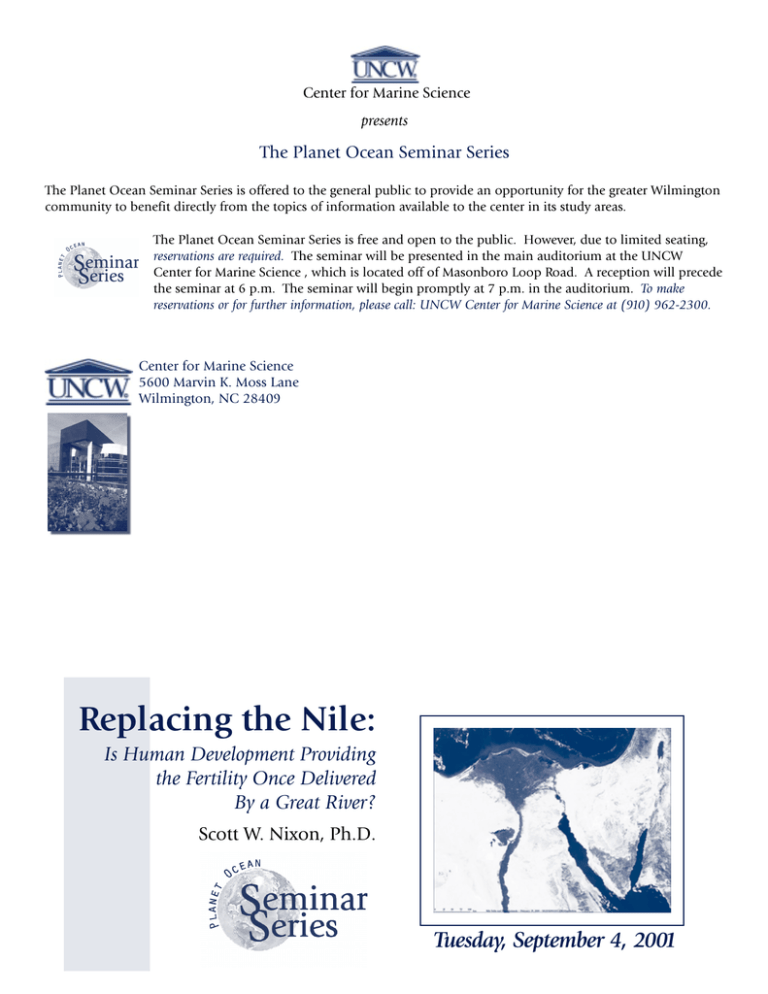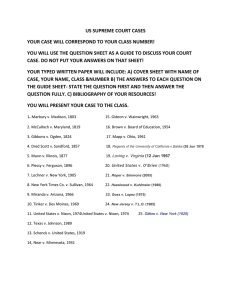Document 11998108
advertisement

Center for Marine Science presents The Planet Ocean Seminar Series The Planet Ocean Seminar Series is offered to the general public to provide an opportunity for the greater Wilmington community to benefit directly from the topics of information available to the center in its study areas. The Planet Ocean Seminar Series is free and open to the public. However, due to limited seating, reservations are required. The seminar will be presented in the main auditorium at the UNCW Center for Marine Science , which is located off of Masonboro Loop Road. A reception will precede the seminar at 6 p.m. The seminar will begin promptly at 7 p.m. in the auditorium. To make reservations or for further information, please call: UNCW Center for Marine Science at (910) 962-2300. Center for Marine Science 5600 Marvin K. Moss Lane Wilmington, NC 28409 Replacing the Nile: Is Human Development Providing the Fertility Once Delivered By a Great River? Scott W. Nixon, Ph.D. Tuesday, September 4, 2001 Replacing the Nile: Is Human Development Providing the Fertility Once Delivered By a Great River? Scott W. Nixon, Ph.D. A cross the globe, coastal waters have felt the impact of increased nutrient loads as nearby development has surged. High levels of nutrients attributed to agricultural and urban activities have raised concerns in many regions — including North Carolina. But estuarine ecologist Scott W. Nixon points to one famed water system that found itself on a rebound — the Mediterranean waters fed by the Nile. Both the decline and the eventual return of those fisheries were in sync with environmental changes brought by development, says Nixon, former Rhode Island Sea Grant director who will speak at the UNC Wilmington Planet Ocean Lecture Series September 4. he drop in coastal Mediterranean fisheries production was apparent with the completion of the Aswan High Dam in 1965. Prior to dam construction, annual flooding along the Nile would deliver about 7,000 to 11,000 tons of biologically available phosphorus, at least 6,000 tons of inorganic nitrogen and 170 tons of silica to the sea waters off Egypt. “These nutrients stimulated a dramatic ‘Nile Bloom’ of phytoplankton, which supported a productive fishery,” Nixon explains. “After full closure of the dam in 1965, flow from the Nile was reduced by over 90 percent, and the fishery collapsed.” he unproductive period for those Mediterranean coastal waters lasted 15 years. “The fishery began a dramatic recovery during the 1980s, coincident with increasing fertilizer use, expanded agricultural drainage, increasing human population and dramatic extensions of urban water supplies and sewage collection systems,” Nixon reports. “Calculations of the potential anthropogenic contribution of T T nutrients (phosphorus and nitrogen) are consistent with the hypothesis that human sewage and agricultural drainage have replaced the fertility once carried by the Nile — though the nature of the productive ecosystem now supporting the fishery appears to be quite different from the historical one.” The Nile is one of many estuarine systems around the world that have drawn Nixon’s attention since he received his doctorate from UNC-Chapel Hill in 1969 – when his research under H.T. Odum included work in waters off Puerto Rico. In fact, when the Sea Grant Association honored Nixon with a Distinguished Service Award this spring, colleagues used his globetrotting reputation in their good-natured roast. hile his research has taken him around the world – including a trip to Micronesia in July – Nixon has been a professor of oceanography at the University of Rhode Island since 1969. He was named director of Rhode Island Sea Grant in 1984, a post he held until 2000. In 1992, he received the B.H. Ketchum Prize from Woods Hole Oceanographic Institution for excellence in coastal research. In May 2000, he was presented the first Achievement Award from the New England Estuarine Research Society for outstanding contributions to estuarine science, research and education. n addition to teaching and research, Nixon serves as co-editor in chief of Estuaries, the journal of the Estuarine Research Foundation. He is also a member of the National Research Council (NRC) Ocean Studies Board – and serves as vice chair of the NRC Everglades restoration committee and chair of the committee reviewing the Florida Keys Carrying Capacity Study. Nixon has published more than 100 articles and book chapters on the ecology of coastal wetlands, estuaries and lagoons and serves on the editorial boards for several scientific journals. He is also a member of the International Ecology Institute. W I Co-sponsored by: Please join us for the third seminar in the series: Replacing the Nile: Is Human Development Providing the Fertility Once Delivered By a Great River? Scott W. Nixon, Ph.D. SEPTEMBER 4, 2001 UNCW Center for Marine Science Auditorium Reception 6 p.m / Seminar 7 p.m. Center for Marine Science 5600 Marvin K. Moss Lane Wilmington, NC 28409 To reserve seats call: Center for Marine Science 910-962-2300 For directions or more information about CMS, please visit our website: http://www.uncwil.edu/cmsr Accommodations for disabilities may be requested by contacting CMS three days prior to the event. 000 copies of this public document were printed at a cost of $000 or $000 per copy (G.S. 143-170.1) • An EEO/AA Institution




